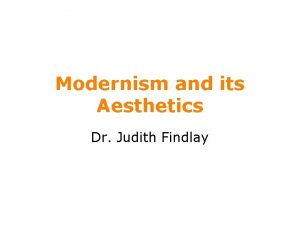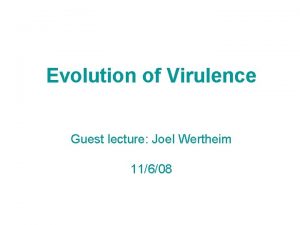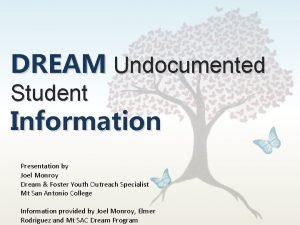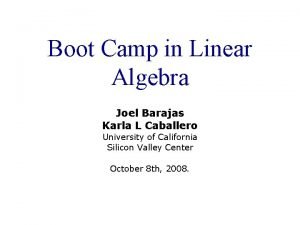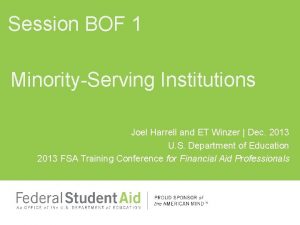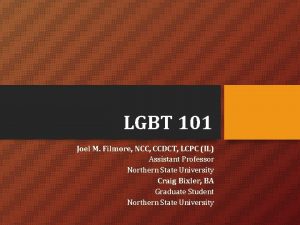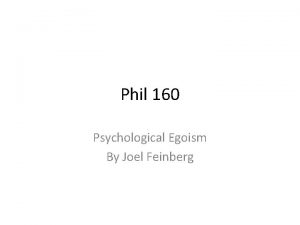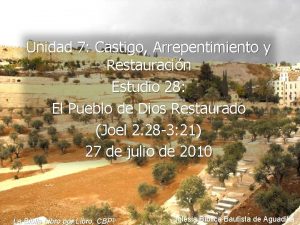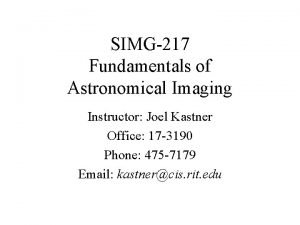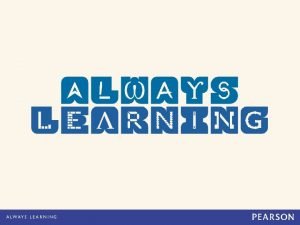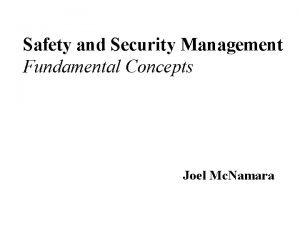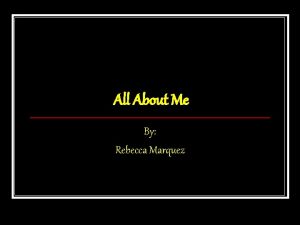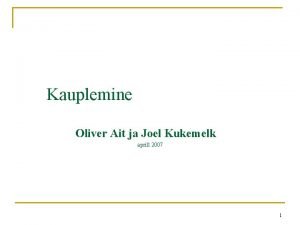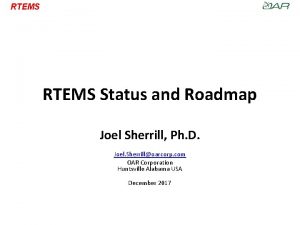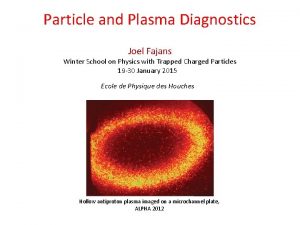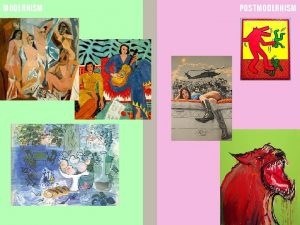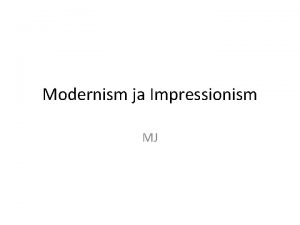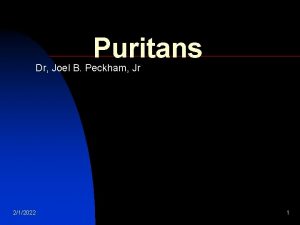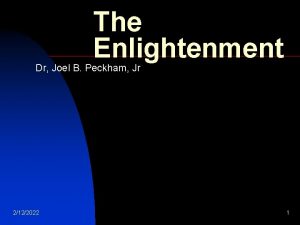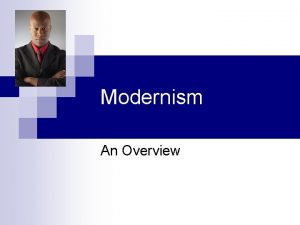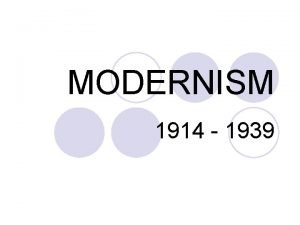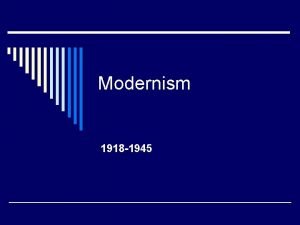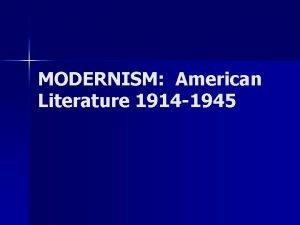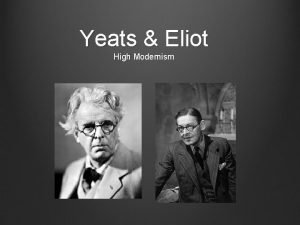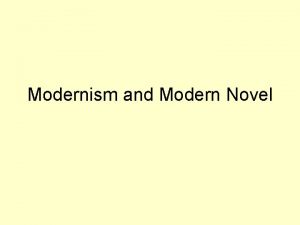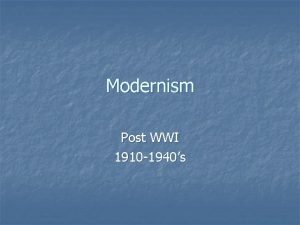Modernism Concepts Dr Joel Peckham 1 Modernism Overview




























- Slides: 28

Modernism — Concepts Dr. Joel Peckham 1

Modernism Overview n Modernism is far too general a term to break down into a simple definition. Unlike Romanticism, one cannot list a set of philosophical beliefs or stylistic characteristics that would broadly apply to every Modern Writer. The Modern Period could be argued to extend from the late 19 th century to the mid-twentieth century and could include any author writing during that period—even if that author hated the modern world and Modernist thinking. In fact, the reactionary impulse—to go back to a time that was more civilized, more Godly, more rational, more whole—may be the most modern of all impulses as it is reflected in the work of Yeats, Eliot, Stevens, Pound, and Jeffers. It may be most useful, then to look at Modern Writers as those authors who responded to the particular challenges that various upheavals from that era posed to the individual. The industrial revolution and its corresponding scientific advances, two major world wars, the development of the atomic bomb, The Great Depression, the Russian Revolution, the end of slavery in the United States, a burgeoning Women’s Movement, the influence of African Americans on world art and music etc. , all combined to create a world in which the old order of things seemed to have been upended and there was no clear sense of a new direction being offered. For some artists, this meant a realization of the freedom only hinted at by the Romantics, for some it meant a disorienting, fragmented, and purposeless reality in which the individual was lost in a churning mass of humanity. What follows is a by no means exhaustive list of terms important to Modernism and Modernists with examples drawn from literature and art intended to stimulate discussion. 2

15 Terms n Existentialism: A philosophy that emphasizes the uniqueness and isolation of individual experience in a hostile or indifferent universe, regards human existence as unexplainable, and stresses freedom of choice and responsibility for the consequences of one's acts. The Problem of Radical Freedom: Derives from the existential belief in absolute freedom—the idea that men can literally do anything and are totally responsible for their own actions. Of course in a world with infinite choices and no clear guide for action, this freedom can be terrifying, leading to Existential Panic: A condition in which the individual, completely aware of his freedom and his responsibility, is overwhelmed by that awareness and cannot act. It can also be defined by the panic caused when one cannot discover his purpose or value in the universe. 3

15 Terms Cont. Absurd Hero: The outlook of the absurd hero is this: determined to continue living with passion even though life appears to be meaningless. The absurd hero does not look back in regret or forward with hope--he or she simply accepts life as it is and keep going in accordance with a personal code. Alienation: Quite simply the sense of being completely disconnected from, rejected by and even repulsed by one's culture—including one's nation, religion, and social class. Misogyny: In many ways modernism is a reaction against Romanticism, that would include the Romantic idealization of the feminine. Many male modernist writers work with an outright hostility toward the feminine, seeing it as the voice of society (an empty realm of superficial value). 4

15 Terms Cont. Deracination: Rootlessness. The sense of being disconnected from the land, the earth, what is natural. Agrarianism: A direct response to the industrialization of America in general and the South in particular—a reactionary movement led by Southern Writers like John Crowe Ransom, Allen Tate, and Robert Penn Warren. This movement emphasized closeness to the land, a spiritual connection between man and God, and for some writers a return to classic forms of literature. Many Agrarians were also segregationists. Segregationist: Someone who believed that the solution to the African American "Problem" was complete separation of the races. Politicized, it meant Jim Crow laws in the South. But it was also embraced by some American authors of the south —seen as a reactionary impulse to return to the ways of the Southern past. Like Nazism it can be seen as a powerful effort to impose order on a world in which old values and systems of belief were under threat from new ways of thinking and the questioning of authority 5

15 Terms Cont. Fragmentation: An extremely important modernist concept, characterized by the effects of an increasingly industrial world on the individual. Many modernists felt that the city and the assembly line—as well the killing machines of war—literally fragmented the individual, treating men as interchangeable, valueless, pieces of some gigantic machine. Ratiocination: The act of wandering around, nomadically—a sense of being lost, of belonging to nothing, no-one and nowhere. Feminism: Belief in the social, political, and economic equality of the sexes. Important in modernism because it inspired great writers like Charlotte Perkins Gilman, Susan Glaspell, Edna St. Vincent Millay and later Adrienne Rich to find their voices in counterpoint to the dominant machismo of the period. Though modern writers were often misogynists, this misogyny was in itself a recognition and response to the increasing economic, political and social power brought on by increasing freedoms afforded different groups as the industrial revolution heated up. 6

15 Terms Cont. Ambiguity: Used by modernist authors, especially poets to get at a sense of uncertainty in the universe. Often evoked through symbolism, ambiguity occurs when a statement, image, symbol or action has no definite meaning. Indeterminacy: Much like ambiguity, indeterminacy occurs when one action, image, symbol or statement is so full with possible meaning, it becomes impossible to select which one is the right one. Stream of Consciousness: A technique used by modernist authors that sought to simulated the associative quality of human thought through the neglect of punctuation and traditional sentence structure. Thoughts progress across the page in a continuous stream. 7

Existentialism A philosophy that emphasizes the uniqueness and isolation of individual experience in a hostile or indifferent universe, regards human existence as unexplainable, and stresses freedom of choice and responsibility for the consequences of one's acts. 8

Jean Paul Sartre n n we show that it is not by turning back upon himself, but always by seeking, beyond himself, an aim which is one of liberation or of some particular realization, that man can realize himself as truly human. what man needs is to find himself again and to understand that nothing can save him from himself, not even a valid proof of the existence of God. – “Existentialism is a Humanism” 9

The Problem of Radical Freedom: Derives from the existential belief in absolute freedom—the idea that men can literally do anything and are totally responsible for their own actions. Of course in a world with infinite choices and no clear guide for action, this freedom can be terrifying, leading to Existential Panic. 10

T. S. Eliot n n Let us go then, you and I, When the evening is spread out against the sky Like a patient etherized upon a table; Let us go, through certain half-deserted streets, The muttering retreats Of restless nights in one-night cheap hotels And sawdust restaurants with oyster-shells: Streets that follow like a tedious argument Of insidious intent To lead you to an overwhelming question. Oh, do not ask, "What is it? " Let us go and make our visit. -- “The Love Song of J. Alfred Prufrock” 11

Jean Toomer n n Crimson Gardens. Hurrah! So one feels. The bareback rider balances agiley on the applause which is the tail of her song. Orchestral instruments warm up for jazz. The flute is a cat that ripples its fur against the deep-purring saxophone. The drum throws sticks. The cat jumps on the piano keyboard. Hi diddle, hi diddle, the cat and the fiddle. Crimson Gardens. . hurrah!. . jumps over the moon. Crimson Gardens! Helen. . O Eliza. . rabbit-eyes sparkling, plays up to, and tries to placate what she considers to be Paul's contempt. She always does that. . Little Liza Jane. . . Once home, she burns with the thought of what she's done. She says all manner of snidy things about him, and swears that she'll never go out again with him along. She tries to get Art to break with him, saying, that if Paul, whom the whole dormitory calls a nigger, is more to him than she is, well, she's through. --From “Bona and Paul” 12

Existential Panic: n A condition in which the individual, completely aware of his freedom and his responsibility, is overwhelmed by that awareness and cannot act. It can also be defined by the panic caused when one cannot discover his purpose or value in the universe. 13

Edvard Munch 14

T. S. Eliot (revisited) n There will be time, there will be time To prepare a face to meet the faces that you meet; There will be time to murder and create, And time for all the works and days of hands That lift and drop a question on your plate Time for you and time for me, And time yet for a hundred indecisions And for a hundred visions and revisions Before the taking of a toast and tea. 15

Absurd Hero: The outlook of the absurd hero is this: determined to continue living with passion even though life appears to be meaningless. The absurd hero does not look back in regret or forward with hope--he or she simply accepts life as it is and keep going in accordance with a personal code. 16

Albert Camus The absurd man says yes and his effort will henceforth be unceasing. If there is a personal fate, there is no higher destiny, or at least there is but one which he concludes is inevitable and despicable. For the rest, he knows himself to be the master of his days. At that subtle moment when man glances backward over his life, Sisyphus returning toward his rock, in that silent pivoting he contemplates that series of unrelated actions which becomes his fate, created by him, combined under his memory's eye and soon sealed by his death. Thus, convinced of the wholly human origin of all that is human, a blind man eager to see who knows that the night has no end, he is still on the go. The rock is still rolling. “The Myth of Sisyphus” 17

Robert Frost n n Whose woods these are I think I know. His house is in the village though; He will not see me stopping here To watch his woods fill up with snow. My little horse must think it queer To stop without a farmhouse near Between the woods and frozen lake The darkest evening of the year. He gives his harness bells a shake To ask if there is some mistake. The only other sound's the sweep Of easy wind and downy flake. The woods are lovely, dark and deep. But I have promises to keep, And miles to go before I sleep. -- “Stopping By Woods on a Snowy Evening” 18

Alienation: n Quite simply the sense of being completely disconnected from, rejected by and even repulsed by one's culture—including one's nation, religion, and social class. 19

Robinson Jeffers n n But for my children, I would have them keep their distance from the thickening center; corruption Never has been compulsory, when the cities lie at the monster's feet there are left the mountains. And boys, be in nothing so moderate as in love of man, a clever servant, insufferable master. There is the trap that catches noblest spirits, that caught – they say – God, when he walked on earth. -- “Shine Perishing Republic” 20

Misogyny: n In many ways modernism is a reaction against Romanticism, that would include the Romantic idealization of the feminine. Many male modernist writers work with an outright hostility toward the feminine, seeing it as the voice of society (an empty realm of superficial value). 21

Frida Kahlo 22

Deracination Rootlessness. The sense of being disconnected from the land, the earth, what is natural. 23

John Dos Passos n n The young man walks fast by himself through the crowd that thins into the night streets: feet are tired from hours of walking; eyes greedy for warm curve of faces, answering flicker of eyes, the set of a head, the lift of a shoulder, the way hands spread and clench. . --from USA 24

Agrarianism n Agrarianism: A direct response to the industrialization of America in general and the South in particular—a reactionary movement led by Southern Writers like John Crowe Ransom, Allen Tate, and Robert Penn Warren. This movement emphasized closeness to the land, a spiritual connection between man and God, and for some writers a return to classic forms of literature. Many Agrarians were also segregationists. 25

I’ll Take My Stand, Twelve Southerners n Opposed to the industrial society is the agrarian, which does not stand in particular need of definition. An agrarian society is hardly one that has no use at all for industries, for professional vocations, for scholars and artists, and for the life of cities. Technically, perhaps, an agrarian society is one in which agriculture is the leading vocation, whether for wealth, for pleasure, or for prestige-a form of labor that is pursued with intelligence and leisure, and that becomes the model to which the other forms approach as well as they may. 26

Segregationist: n Someone who believed that the solution to the African American "Problem" was complete separation of the races. Politicized, it meant Jim Crow laws in the South. But it was also embraced by some American authors of the south —seen as a reactionary impulse to return to the ways of the Southern past. Like Nazism it can be seen as a powerful effort to impose order on a world in which old values and systems of belief were under threat from new ways of thinking and the questioning of authority 27

28
 Judith findlay
Judith findlay Romanticism principles
Romanticism principles Joel wertheim
Joel wertheim Joel monroy
Joel monroy Outline of the book of joel
Outline of the book of joel Joel barajas
Joel barajas 100 gbps ethernet
100 gbps ethernet Joel harrell
Joel harrell Ccdct
Ccdct Psychological egoism examples
Psychological egoism examples Tilapäiset liikennejärjestelyt katualueella
Tilapäiset liikennejärjestelyt katualueella Joel 2 29-32
Joel 2 29-32 Joel kastner
Joel kastner Joel warrican
Joel warrican Joel abraham anoop
Joel abraham anoop Dr joel miller
Dr joel miller Joel camey
Joel camey Oliver ait
Oliver ait Joel laucher
Joel laucher Joel rainey pastor
Joel rainey pastor Billy joel israel
Billy joel israel Oldcart
Oldcart Joel anttila
Joel anttila Joel sherrill
Joel sherrill Joel kuipers
Joel kuipers Thermal spectrum
Thermal spectrum Joel holik
Joel holik Joel niznick
Joel niznick Fluerence
Fluerence
